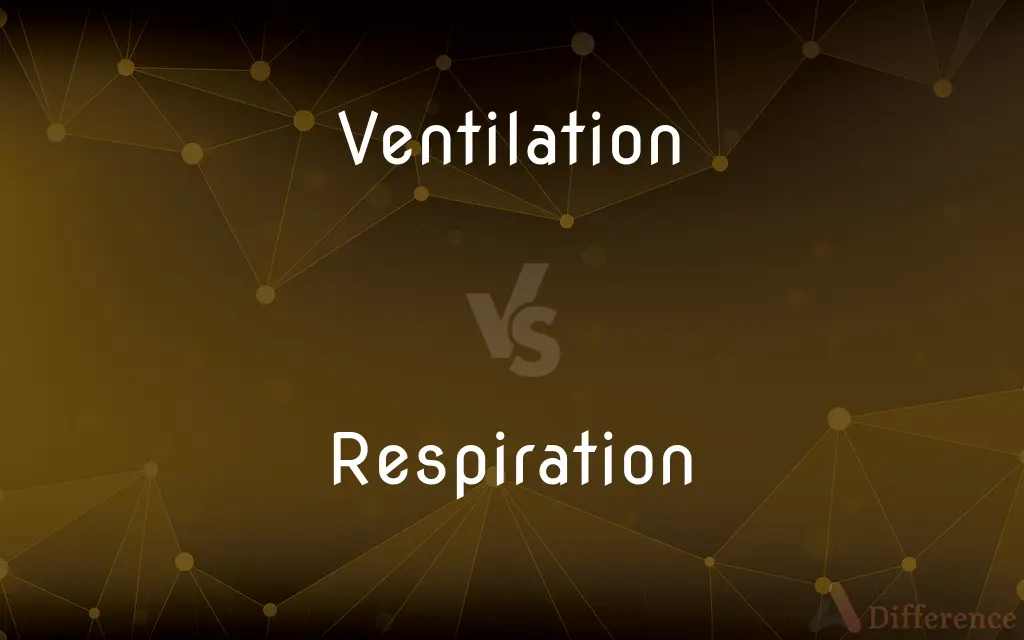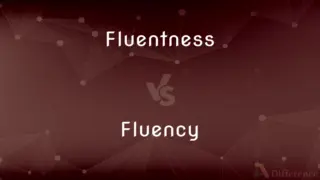Ventilation vs. Respiration — What's the Difference?
By Tayyaba Rehman — Updated on September 23, 2023
Ventilation refers to the process of circulating fresh air, while respiration is the process organisms use to exchange gases with their environment, primarily oxygen and carbon dioxide.

Difference Between Ventilation and Respiration
Table of Contents
ADVERTISEMENT
Key Differences
Ventilation and respiration, while related in the context of breathing, signify distinct processes. Ventilation primarily describes the movement and exchange of air in and out of spaces, whether those spaces be rooms or lungs. It ensures fresh air supply and the removal of stale or contaminated air.
Conversely, respiration delves deeper into biology. It's the metabolic process wherein organisms exchange oxygen and carbon dioxide between cells and the environment. This intricate process is essential for energy production within cells and involves multiple stages, including glycolysis and the Krebs cycle.
In human anatomy, the act of breathing combines both ventilation and respiration. The act of inhaling and exhaling, facilitated by the diaphragm and intercostal muscles, is a form of ventilation. Once the air reaches the alveoli in the lungs, the exchange of gases—oxygen and carbon dioxide—occurs, representing the respiration aspect.
In architectural and engineering contexts, ventilation is often discussed concerning buildings and structures. It pertains to systems that ensure adequate airflow, like HVAC systems. Respiration, however, remains primarily a biological term, denoting a vital process for most life forms on Earth.
Despite their differences, ventilation and respiration intersect in the domain of health and safety. Proper ventilation can significantly impact respiratory health by ensuring clean, fresh air, free from pollutants and pathogens.
ADVERTISEMENT
Comparison Chart
Definition
Circulation and replacement of air.
Biological process of gas exchange.
Context
Often used in architectural and engineering settings.
Primarily used in biological and medical contexts.
Purpose
Ensures fresh air supply and removal of stale air.
Produces energy through the exchange of gases.
Mechanism
Involves fans, ducts, windows, or other means of air circulation.
Involves cellular processes, including glycolysis and the Krebs cycle.
Relation to Health
Directly affects air quality and can impact respiratory health.
Essential for life, and any disruption can lead to health complications.
Compare with Definitions
Ventilation
Ensures air quality in indoor spaces.
Proper ventilation in the workshop helps reduce the risk of inhaling fumes.
Respiration
Cellular process to produce energy.
Respiration is crucial for cell survival and function.
Ventilation
In medical contexts, refers to breathing mechanisms.
The patient's ventilation was aided with a respirator.
Respiration
Essential for most life forms on Earth.
Disruptions in respiration can lead to severe health issues.
Ventilation
Can be natural or mechanical.
Open windows provide natural ventilation, while HVAC systems offer mechanical ventilation.
Respiration
Involves inhaling oxygen and exhaling carbon dioxide.
Human respiration relies on the lungs and respiratory system.
Ventilation
The process of circulating air.
The room's ventilation ensured a constant flow of fresh air.
Respiration
Has multiple stages, including glycolysis.
The Krebs cycle is a part of cellular respiration.
Ventilation
A method to remove stale or polluted air.
The building's ventilation system filters out contaminants.
Respiration
The process by which organisms exchange gases.
Plants undergo respiration, just like animals.
Ventilation
The replacement of stale or noxious air with fresh air.
Respiration
The action or process of inhaling and exhaling; breathing. Also called ventilation.
Ventilation
The mechanical system or equipment used to circulate air or to replace stale air with fresh air.
Respiration
An act of inhaling and exhaling; a breath.
Ventilation
See respiration.
Respiration
The action or process by which an organism without lungs, such as a fish or plant, exchanges gases with its environment.
Ventilation
The maintenance of breathing by artificial means.
Respiration
The oxidative process occurring within living cells by which the chemical energy of organic molecules is converted in a series of metabolic steps into usable energy in the form of ATP, involving the consumption of oxygen and the production of carbon dioxide and water as byproducts.
Ventilation
A breath that is induced by artificial means.
Respiration
Any of various analogous metabolic processes by which certain organisms, such as anaerobic bacteria and some fungi, obtain energy from organic molecules without consuming oxygen.
Ventilation
The replacement of stale or noxious air with fresh.
Respiration
The process of inhaling and exhaling; breathing, breath.
Ventilation
The mechanical system used to circulate and replace air.
Respiration
An act of breathing; a breath.
Ventilation
An exchange of views during a discussion.
Respiration
Any similar process in an organism that lacks lungs that exchanges gases with its environment.
Ventilation
The public exposure of an issue or topic.
Respiration
The process by which cells obtain chemical energy by the consumption of oxygen and the release of carbon dioxide.
Ventilation
The bodily process of breathing; the inhalation of air to provide oxygen, and the exhalation of spent air to remove carbon dioxide.
Respiration
The act of respiring or breathing again, or catching one's breath.
Ventilation
(medicine) The mechanical system used to assist breathing.
Respiration
Relief from toil or suffering: rest.
Till the dayAppear of respiration to the justAnd vengeance to the wicked.
Ventilation
The act of ventilating, or the state of being ventilated; the art or process of replacing foul air by that which is pure, in any inclosed place, as a house, a church, a mine, etc.; free exposure to air.
Insuring, for the laboring man, better ventilation.
Respiration
Interval; intermission.
Ventilation
The act of refrigerating, or cooling; refrigeration; as, ventilation of the blood.
Respiration
The act of resping or breathing; the act of taking in and giving out air; the aggregate of those processes bu which oxygen is introduced into the system, and carbon dioxide, or carbonic acid, removed.
Ventilation
The act of fanning, or winnowing, for the purpose of separating chaff and dust from the grain.
Respiration
The metabolic processes whereby certain organisms obtain energy from organic moelcules; processes that take place in the cells and tissues during which energy is released and carbon dioxide is produced and absorbed by the blood to be transported to the lungs
Ventilation
The act of sifting, and bringing out to view or examination; free discussion; public exposure.
The ventilation of these points diffused them to the knowledge of the world.
Respiration
A single complete act of breathing in and out;
Thirty respirations per minute
Ventilation
The act of giving vent or expression.
Respiration
The bodily process of inhalation and exhalation; the process of taking in oxygen from inhaled air and releasing carbon dioxide by exhalation
Ventilation
The act of supplying fresh air and getting rid of foul air
Ventilation
A mechanical system in a building that provides fresh air;
She was continually adjusting the ventilation
Ventilation
Free and open discussion of (or debate on) some question of public interest;
Such a proposal deserves thorough public discussion
Ventilation
The bodily process of inhalation and exhalation; the process of taking in oxygen from inhaled air and releasing carbon dioxide by exhalation
Common Curiosities
Why is respiration vital for humans?
Respiration is essential for energy production and the exchange of vital gases.
Can a building have natural ventilation?
Yes, buildings can have natural ventilation through windows, vents, or other openings.
What does ventilation primarily refer to?
Ventilation primarily refers to the circulation and replacement of air.
Is respiration only about breathing?
No, respiration is a broader biological process encompassing gas exchange and energy production in cells.
Can ventilation affect health?
Yes, proper ventilation impacts air quality, affecting respiratory health.
How does mechanical ventilation work in medical settings?
Mechanical ventilation involves machines that help or take over a patient's breathing process.
Is respiration the same in all organisms?
While the core concept is similar, the mechanisms of respiration can vary among organisms.
Share Your Discovery

Previous Comparison
Fluentness vs. Fluency
Next Comparison
Suit vs. SmokingAuthor Spotlight
Written by
Tayyaba RehmanTayyaba Rehman is a distinguished writer, currently serving as a primary contributor to askdifference.com. As a researcher in semantics and etymology, Tayyaba's passion for the complexity of languages and their distinctions has found a perfect home on the platform. Tayyaba delves into the intricacies of language, distinguishing between commonly confused words and phrases, thereby providing clarity for readers worldwide.















































